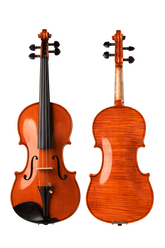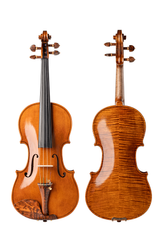Andreas Jakob Romberg (1767-1821)
Andreas Jakob Romberg (1767-1821) was a renowned German violinist, composer, and conductor, whose musical talents and artistic achievements left a profound impact on the European music scene during the late 18th and early 19th centuries.
Romberg was celebrated for his exceptional performance skills, diverse repertoire of musical works, and leadership abilities, earning him a place of prominence in the world of music. In his relatively brief yet illustrious career, he made outstanding contributions to the music world, passing on his musical genius to future generations of musicians.
Early Life and Musical Enlightenment
Andreas Jakob Romberg was born on November 27, 1767, in Friedberg, North Rhine-Westphalia, Germany, into a family with a rich musical background. His father, Joseph Anton Romberg, was a renowned violinist and composer. From an early age, Romberg demonstrated a keen interest in music and began learning the violin under the guidance of his father.
His musical talents were evident from a young age. Romberg's father played a crucial role in his upbringing, not only imparting musical skills but also exposing him to various musical cultures across Europe. At the age of 14, in 1781, Romberg journeyed to Paris to pursue further studies, an experience that would profoundly shape his musical career.
The Beginnings and Peak of His Music Career
During his time in Paris, Romberg was inspired by the finest musicians of Europe, and his performance skills matured as he started to perform in various venues. His musical talents garnered attention and quickly earned him a reputation in the music community. As his fame grew, Romberg received invitations to perform in music halls and at royal occasions throughout Europe, earning widespread acclaim.
In 1800, Romberg returned to Germany and was appointed as the conductor and chief conductor of the Municipal Theater in Flensburg. This period is considered the peak of his musical career. His conducting talents were acknowledged, and he embarked on creating an extensive repertoire of music, encompassing symphonies, chamber music, operas, and concertos, among other forms. His music not only received extensive performances and appreciation in Germany but also across Europe.
Musical Style and Influence
Romberg's musical style integrated elements of both classicism and romanticism. His compositions were emotionally rich and technically adept, characterized by a unique creative flair and high artistic value. Among his most representative works were his violin concertos and string quartets, which showcased remarkable technical prowess and musical expressiveness. His music gained popularity during his time and exerted a profound influence on future generations of musicians.
Romberg's musical oeuvre reflects his passion for music and his dedication to artistic creation. His works were hailed as exemplars of musical composition, inspiring many later musicians to carry on and develop his musical legacy.
Later Life and Passing
Despite the achievements in his music career, Romberg's later life was not without challenges. His health gradually declined, adversely affecting his music composition and performances. His deteriorating physical condition compelled him to reduce his conducting and performing activities.
On June 10, 1821, Andreas Jakob Romberg passed away in Flensburg at the age of 53. His untimely death deprived the music world of a great musician and composer.
Musical Legacy and Influence
Andreas Jakob Romberg's musical legacy continued to be cherished after his passing. Though his career was relatively short, he left behind a vast array of excellent musical compositions that are still appreciated today for their technical brilliance and musical expressiveness.
Romberg's music continued to be widely performed across Europe, and his unique style and musical philosophy profoundly influenced subsequent musicians. He is recognized as one of the significant figures in the history of music.
As a musician and composer, Romberg served as a role model for future generations of musicians, inspiring musicians worldwide with his musical talent and passion for music, encouraging them to explore and create exceptional musical works.
Conclusion
Andreas Jakob Romberg was a musician who showcased extraordinary musical talent in his short life. His music and influence continue to be passed down through the generations, ensuring that he is remembered as an outstanding musician, composer, and conductor. His passion for music and pursuit of artistic creation have earned him a place of significance in the annals of music history. The traditions and spirit of his music will continue to inspire music enthusiasts and creators, ensuring that he will never be forgotten.
Musical works
Symphonies
- Symphony in G major
- Symphony in E major
- Symphony in A major
- Symphony in F major
Chamber Music
- String Quartets
- String Quintets
- String Sextets
- String Septets
Violin Concertos
- Violin Concerto in A minor
- Violin Concerto in E major
- Violin Concerto in D major
Vocal Works
- Opera "The Hunter of the Rocky Mountains"
- Opera "Charles VI"
- Elegiac Ode for August I
In addition to the listed works, Romberg composed a vast array of chamber music pieces, piano compositions, songs, and other vocal and instrumental works. His compositions showcased his diverse musical talents and skillfully blended elements of classical and romantic styles. His music was highly acclaimed during his time and continues to be cherished and performed by musicians and audiences today. Romberg's musical legacy has had a profound impact on the music world, and his works remain beloved and admired to this day.
Follow Fiddlover for more violin content.





